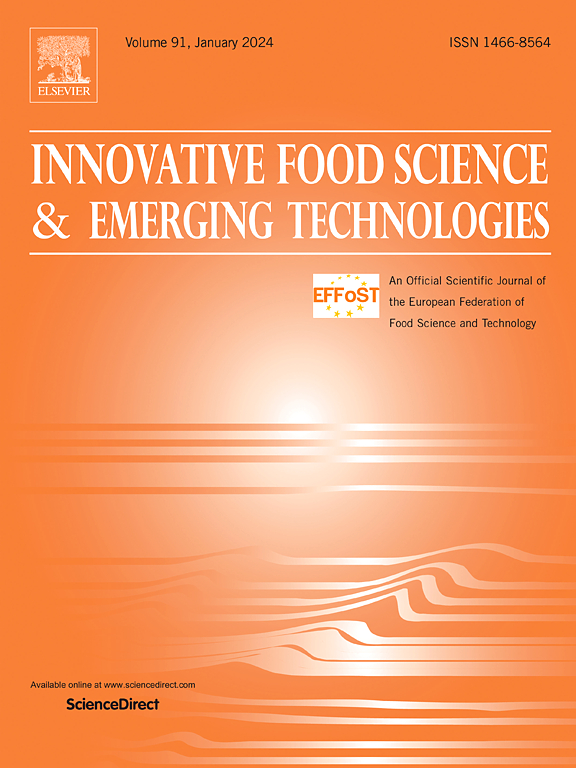Decolourised barley and rice protein isolate – Enhanced techno-functional and sensory properties
IF 6.3
1区 农林科学
Q1 FOOD SCIENCE & TECHNOLOGY
Innovative Food Science & Emerging Technologies
Pub Date : 2025-03-10
DOI:10.1016/j.ifset.2025.103999
引用次数: 0
Abstract
Plant-based protein is increasingly preferred over animal-based protein from an environmental and ethical standpoint. EverPro®, a barley and rice protein isolate (BRPI), upcycled from brewers spent grain is a commercially available novel plant protein. The aim of this study was to compare two BRPIs, EverPro® Dark Fraction (EDF) and EverPro® Light Fraction (ELF), which underwent an additional decolourisation process. Both ingredients showed high solubility values over a range of pH values which were found to be linked with their zeta potential. Other techno-functional properties were also analysed, where only slight differences between ingredients were found. Key differences between EDF and ELF were colour and sensory characteristics. ELF showed a significantly higher L* values (beige/sandy) compared to EDF (dark brown). Moreover, a major decrease in aroma and metabolite compounds was observed for ELF. The sensory analysis revealed ELF was perceived significantly lower in bitter, burnt/roasty descriptors in comparison to EDF. These findings correlated with a change in tribology measurements, specifically, an increase in lubrication of ELF solution compared to EDF. The increase in lubrication resulted in a higher viscosity perception by the panellists. Overall, these findings highlight the extended potential of EverPro® with enhanced physical properties for application in a wider range of food and beverage systems.
脱色大麦和大米分离蛋白。增强的技术功能和感官特性
从环境和伦理的角度来看,植物蛋白比动物蛋白越来越受欢迎。EverPro®是一种大麦和大米分离蛋白(BRPI),从啤酒酿造者的废谷物中回收,是一种商业上可用的新型植物蛋白。本研究的目的是比较两种brpi, EverPro®Dark Fraction (EDF)和EverPro®Light Fraction (ELF),这两种brpi都经历了额外的脱色过程。这两种成分在一定的pH值范围内都表现出高溶解度,这与它们的ζ电位有关。其他技术功能特性也进行了分析,其中只发现成分之间的细微差异。EDF和ELF的主要区别在于颜色和感官特征。与EDF(深棕色)相比,ELF(米色/沙色)的L*值明显更高。此外,观察到ELF的香气和代谢物化合物显著减少。感官分析显示,与EDF相比,ELF在苦味、烧焦/烘焙描述词中的感知明显较低。这些发现与摩擦学测量的变化有关,特别是与EDF相比,ELF溶液的润滑性能有所提高。润滑的增加导致小组成员对粘度的感知更高。总的来说,这些发现突出了EverPro®的扩展潜力,增强了其物理性能,可应用于更广泛的食品和饮料系统。
本文章由计算机程序翻译,如有差异,请以英文原文为准。
求助全文
约1分钟内获得全文
求助全文
来源期刊
CiteScore
12.00
自引率
6.10%
发文量
259
审稿时长
25 days
期刊介绍:
Innovative Food Science and Emerging Technologies (IFSET) aims to provide the highest quality original contributions and few, mainly upon invitation, reviews on and highly innovative developments in food science and emerging food process technologies. The significance of the results either for the science community or for industrial R&D groups must be specified. Papers submitted must be of highest scientific quality and only those advancing current scientific knowledge and understanding or with technical relevance will be considered.

 求助内容:
求助内容: 应助结果提醒方式:
应助结果提醒方式:


